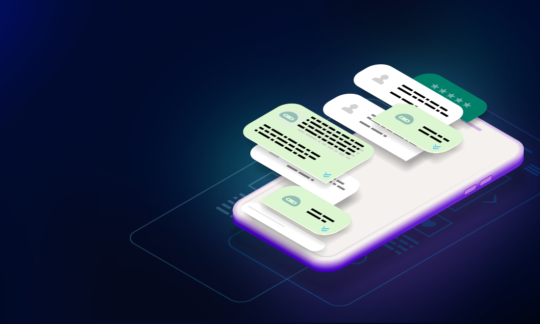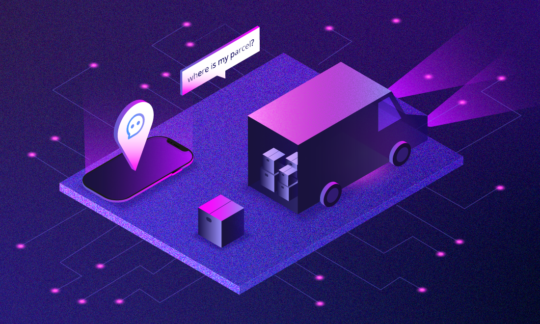Top Customer Communication Channels for AI Chatbots
Table of contents
As of 2023, 80% of CEOs have changed or intend to change how they manage client engagement using conversational AI technologies. AI chatbots help you communicate with customers where they’re at, whether that’s through social media, your website, or an online application. But what are the most popular customer communication channels for AI chatbots? From what we’ve observed over the last few years, the top communication channels include Facebook, Skype, WhatsApp, and webchat.
In this article, we’ll explore ways businesses are using AI chatbots to improve customer experience, reduce operational costs, and streamline communications through the above-mentioned applications and platforms.
What Is a Chatbot?
A chatbot is a software application programmed to assist humans with requests, questions, and various tasks. However, it’s crucial to note that chatbots vary significantly in their capabilities. Some function on straightforward command-response patterns – we call these rule-based chatbots; while others exhibit advanced language processing skills by utilising NLU systems and AI to deliver highly accurate and human-like responses – we call these conversational chatbots.
In this article, we will be focusing on the second variety of chatbots, specifically on how these bots can benefit businesses in a variety of scenarios.
Benefits of Facebook Messenger AI Chatbots
There are more than 375,000 people from over 200 countries that engage with Messenger bots every day. These are rule-based bots so they can only reply according to linear chains of command. But many businesses have already started implementing Facebook Messenger AI chatbots. AI chatbots offer several advantages:
Saving Time: Messenger AI chatbots can understand the intention of the user on the other side so there’s little time wasted. They act as personal assistants for your team, performing tasks including:
- Scheduling appointments,
- Gathering feedback as a support agent
- Even upselling customers on existing plans
Automating Sales: If you’re an e-commerce store, AI chatbots can handle communication throughout the entire customer journey, from the initial purchase to assisting with returns.
Driving Sales: AI chatbots make businesses more efficient and drive sales by sharing updates, engaging customers through Natural Language Understanding, qualifying leads, and boosting conversions.
Qualifying Leads: Chatbots can qualify leads and move them through the sales funnel via a series of follow-up questions, making the process efficient and user-friendly.
Boosting Conversions: Messenger chatbots can boost sales by extending special offers, sending exclusive invitations, personalising checkouts, offering upsells, and gathering customer feedback.
Industries that Facebook Messenger Chatbots Help Most
Facebook Messenger Chatbots serve as an automated frontline, responding to questions and facilitating transactions at all hours, ultimately making your customer experience exceptionally convenient. Messenger Chatbots can be especially helpful for the following industries:
- Healthcare: AI chatbots help chiropractors, doctors, massage therapists, physical therapy clinics, hospitals, and more with administrative tasks, including scheduling appointments, follow-ups, and giving specific information about a patient.
- Travel: AI chatbots can help travel agencies and airports by automating updated itineraries, account information, travel information, complaints, and FAQs.
- Banking: Automating basic tasks and communications via AI chatbots can lead to a 22% reduction in operating costs, freeing up resources for enhanced service and growth.
Benefits of Skype for Business AI Chatbots
Skype for Business AI chatbots helps teams communicate effectively within their organisation as well as for B2B client communication. Here are some ways Skype AI chatbots can improve business operations and customer experience:
- Increased Customer Engagement: For businesses that still use Skype for Business, AI assistant chatbots can increase booking rates by 25%, meeting the expectation of immediate responses.
- Customer Onboarding: Chatbots can provide seamless onboarding experiences, quickly answering customer questions about a service, platform, or mobile app.
- Ordering and Refunding: Automation of information collection for orders and refunds is easily handled by Skype for Business chatbots.
- Lead Generation: Bots generate leads through natural conversation, offering personalised suggestions based on user preferences, which is more user-friendly than pop-ups.
The introduction of AI chatbots has enabled the convenience of B2B as well as B2C communications, and Skype for Business is a perfect example of that. Skype for Business AI bots can provide innovative and efficient solutions to a range of business challenges.
Skype for Business Chatbots Across Industries
Most industries could benefit from AI chatbots, however since the majority of companies that still use Skype for Business are in the IT space, these companies are likely the first to adopt AI into their communications strategy:
- Information Technology Companies: Chatbots assist both externally, by resolving customer troubleshooting issues, and internally, by aiding employees with various inquiries.
- Computer Software Companies: Chatbots act as onboarding specialists, answering new customers’ queries and freeing up support team time for other critical tasks.
- Marketing & Advertising: Chatbots are valuable for lead generation and 24/7 customer engagement, readily answering queries about your services.
Benefits of WhatsApp AI Chatbots
WhatsApp has certainly made headway into the global arena ranking as one of the top messaging apps in over 60 countries (roughly 30% of the world) in 2022. Because it’s available in over 60 languages, this messaging app can be used as an effective business tool. Some advantages of investing in WhatsApp AI chatbots include:
24/7 Availability – Zendesk found that 76% of customers wanted an answer right away when contacting a business. The shorter the wait times the greater your customer’s brand experience. When customers have a spare minute from their busy days, they want quick answers from companies and this trend doesn’t see any signs of slowing down.
Customer Satisfaction – WhatsApp chatbots can be programmed to handle a wide array of inquiries with a human touch. Like a customer support agent, they can make product recommendations, extend special offers, and process customer complaints, escalating the issue when necessary.
Empowering Sales Team – Chatbots automate easier inquiries allowing your sales team to focus on the bigger deals and more complex interactions where they’re needed most. Additionally, your sales team will be able to look at the chatbot data and generate insight into what customers truly care about.
With WhatsApp being the preferred messaging application in over 60 countries, there are major opportunities for tech-savvy business owners looking to reinvent their customer communications strategy.
Real-Life Use Cases of WhatsApp AI Chatbots
Since WhatsApp is more prevalent across the world, WhatsApp AI chatbots have been used to assist millions during COVID-19’s outbreak, automate registration for youth soccer teams in Africa, and assist with new product launches in Brazil:
MyGov Corona Helpdesk
The Indian government in response to COVID-19’s global impact utilised WhatsApp Chatbots to communicate safety precautions to over 84 million users. The chatbots handled over 110 million queries in both English and Indian, diagnosing remotely, and handling misconceptions surrounding virus transmission.
Stars of Africa: Football Academy Trials Registration
Stars of Africa, a leading youth football academy in South Africa, partnered with Hash Ads to overcome the challenges posed by an overwhelming volume of applications and an inefficient registration process for its annual open trials. They launched WhatsApp chatbot automation to guide players through the registration process, update them about trial dates and results, and export each successful registration to a Google spreadsheet. This new system led to record-breaking attendance and a 60% surge in trial revenue.
Unilever Brazil
To launch its new line of washing products, a major consumer goods company leveraged WhatsApp’s popularity in Brazil and introduced MadameBot. This AI chatbot provided clothing care advice, shared information about new products, engaged users with relevant memes, and offered significant discounts and free shipping. Within just a week, MadameBot exchanged nearly 300,000 messages and generated sales 14 times higher than average.
Benefits of Webchat AI Bots
Webchat is the method that most people use to interact with a chatbot. On websites, they often appear as modular chat windows on a corner of the screen. Investing in webchat AI bots can be a game-changer for businesses seeking to optimise their customer service and elevate their user experience. By seamlessly handling frequent and repetitive inquiries, AI chatbots can free up your skilled staff to focus on more complex tasks.
According to Gartner, organisations report a reduction of up to 70 percent in call, chat, and email inquiries after implementing a chatbot. Let’s take a look at some other ways webchat AI chatbots can help solve business problems:
Reduced Operating Costs – Chatbots can dramatically cut down the costs related to call centre staffing and training. By dealing with common, repetitive customer queries, chatbots give room for skilled staff to stretch their abilities and exceed customer satisfaction levels in unprecedented ways.
Client Satisfaction – Most often, customers reach out only when they encounter a problem. Drawing from past experiences, they might brace themselves for a lengthy wait for customer support. A chatbot that promptly and efficiently resolves their issue can significantly enhance their experience with your brand.
Availability – In today’s fast-paced world, customers are increasingly demanding round-the-clock support. A study found that 43% of retail consumers expect 24/7 support from e-commerce businesses. Regardless of the industry you’re in, you can meet, if not exceed, these expectations by offering continuous support through a live webchat AI bot.
Use Cases for Webchat AI Chatbots
The spectrum of webchat applications in the business landscape is extensive and continues to grow rapidly as technology advances. Let’s explore some of the practical, customer-centric tasks webchats are currently fulfilling:
Addressing Common Customer Inquiries: A significant portion of calls received by call centres, typically around 80%, revolve around repetitive issues. Chatbots can be programmed to manage these high-frequency inquiries, efficiently providing valuable information that may be otherwise hidden deep within the website. With integration into CRM or other backend systems, they can also assist with resolving account-specific queries.
Managing Customer Complaints: Businesses often have set protocols for recording and addressing customer complaints. Chatbots can be equipped to manage these procedures, including identifying the right signals to involve a customer service representative when necessary.
Processing Payments: Inquiries regarding billing and account balances are commonplace across various industries. Chatbots can effectively respond to these queries and even offer support for digital payment processes.
Deploy Your Chatbot Wherever You Want with SentiOne Automate
In conclusion, AI chatbots have significantly changed how businesses communicate with customers. By leveraging AI chatbots on platforms such as Messenger, WhatsApp, Skype and more, businesses can enhance customer engagement, foster better relationships, cut down on costs, and drive growth. Indeed, the future is bright for businesses that are willing to adopt this game-changing technology. If you need help with choosing the right communication channel for your AI chatbot, book a meeting with one of our staff members today.
Article Summary
This article explores the benefits and applications of AI chatbots on popular communication platforms like Facebook Messenger, Skype, WhatsApp, and webchat. It highlights their roles in improving customer experience, reducing costs, and enhancing business operations. Real-life examples show how chatbots have been used effectively in various industries.



